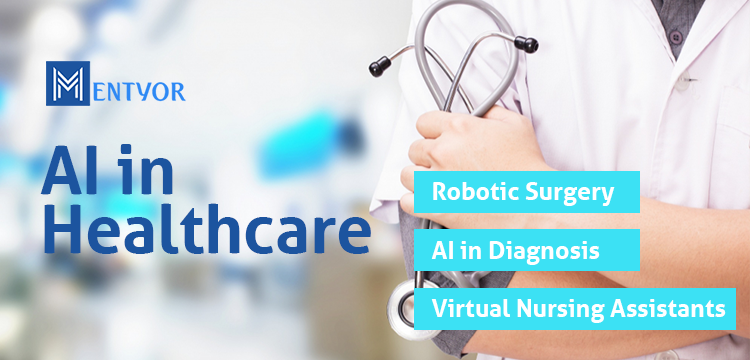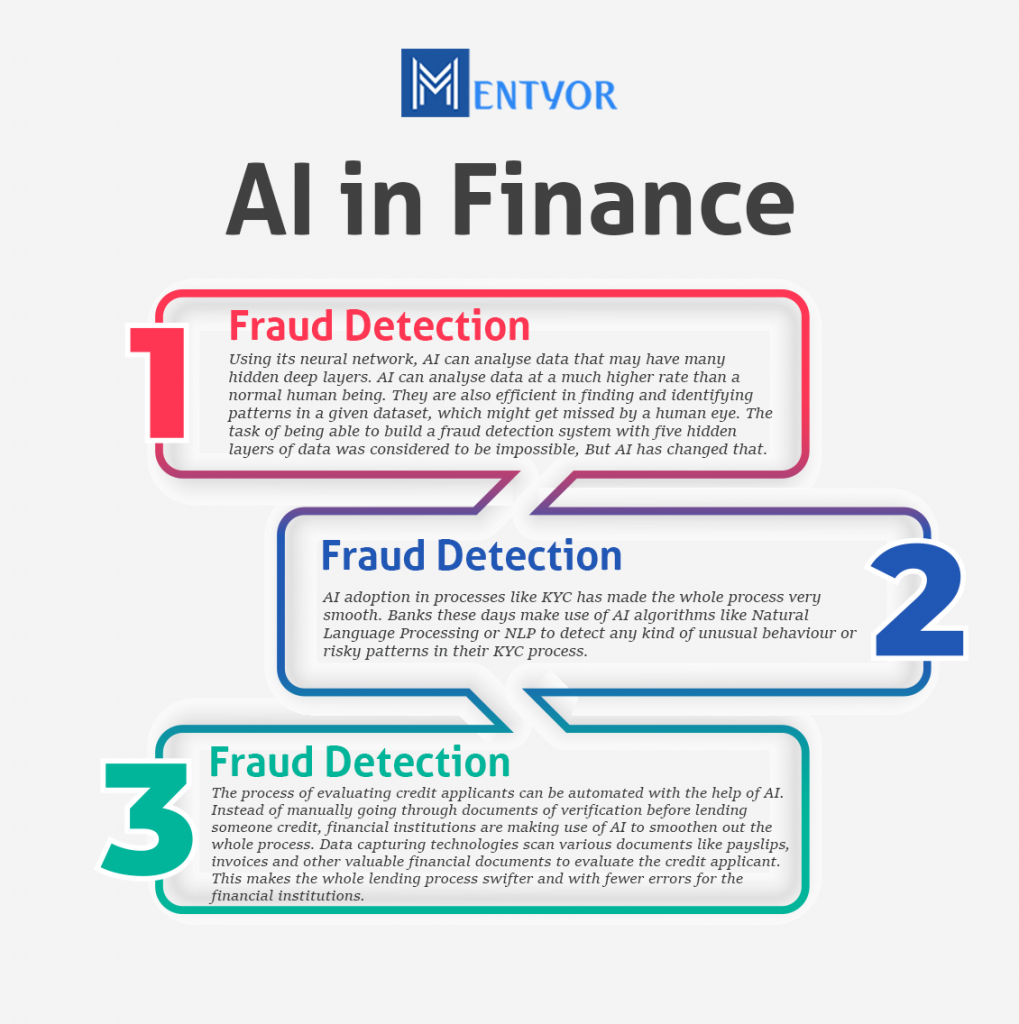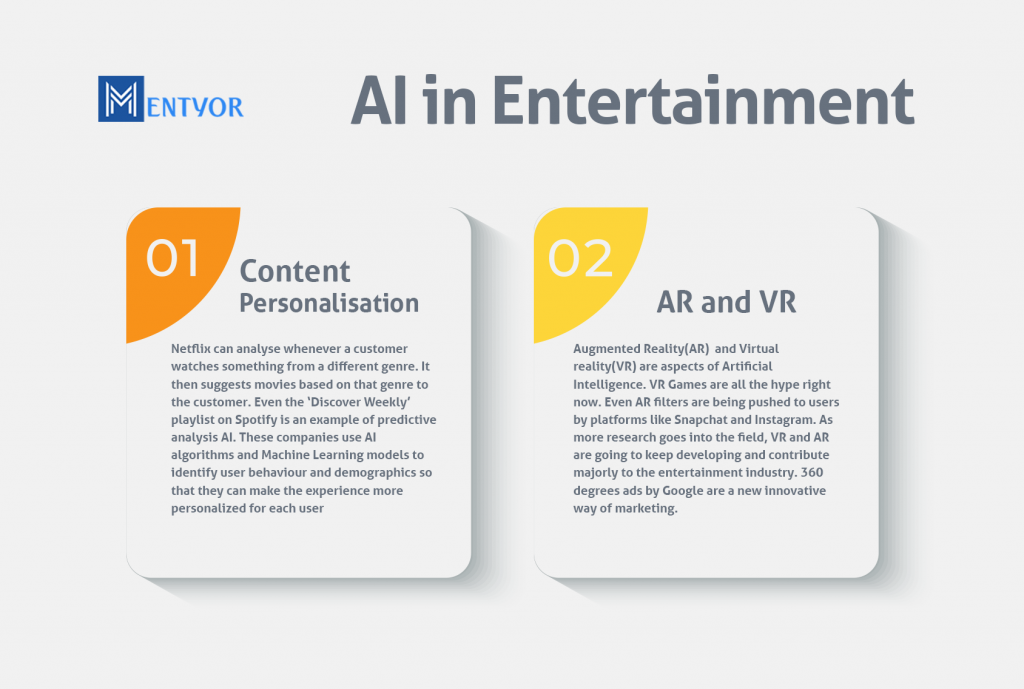Imagine waking up in the morning as you unlock your phone with your face ID. You go directly to check your social media, catching up with all the news that happened while you were asleep. Or maybe, if not news then your favourite influencers and celebrities flood your news feeds. Soon, follows your health App while you begin your workout for the day. But do you know the one common thing that contributes to all these events?
Artificial Intelligence. AI is the driving force behind the face ID on our phones to our social media which curates a personalised feed for each user. Even the digital watches that we wear, all of them have artificial Intelligence as the driver of their functionality.
Applications of AI in our everyday life has become indispensable. From life-saving innovations in healthcare to virtual assistants like Siri or Alexa, Ai has changed the world.
With a world revolutionized by AI, the applications of the same are endless. Here we list down some of the most innovative and useful applications of AI in the world today.
What is Artificial Intelligence?
To define AI in simple terms, it refers to providing computers with the ability to impersonate human intelligence and their decision-making powers. Not only does AI wish to reach a level of development like humans, but AI engineers wish to supersede humans and make a complete error-free computational individual who could create a more efficient and innovative world.
Learn more about Artificial Intelligence: ARTIFICIAL INTELLIGENCE: AN ULTIMATE GUIDE
The applications of AI can be found in a myriad of varieties. We list down a few categories in which AI can be predominantly found. These categories are:
- AI in Healthcare
- AI in Finance
- AI in Entertainment
- AI in Social Media
- AI in robotics
Let’s explore each category in detail!
AI in Healthcare

The medical and healthcare industry is the one in which AI has made developments in leaps and bounds. Artificial Intelligence has managed to increase human life expectancy and improve quality of life in various ways. In 2021 alone, the global AI market was estimated to be worth around $10.4 Billion. The growth rate of AI in a global capacity is expected to be around 38.4% by 2030 [1]. It is hands-down one of the best applications of AI.
Artificial Intelligence makes use of Big data through its Machine Learning algorithms to make medical diagnoses. Using its predictive analysis function, AI can map out better preventive care measures which are more accurate and proactive. A few examples of AI in Healthcare are:
Robotic Surgery
We are all familiar with the science fiction movies that portray robots as both a boon and a bane to society. But when it comes to assistive robotics surgeries, these AI-driven robots have been a blessing. The improvement in robots-assisted surgeries can be seen in the depth and level of accuracy that can be seen in making incisions. Usually, Surgeries tend to depend upon the prowess and skills of the surgeon. But with Robots, a streamlined process that remains constant across all surgeries can be developed.
The changes in case-to-case based surgeries can be avoided with the assistance of AI-driven robots. AI-based robots are precise in their actions and thus can avoid any mishaps like sudden shudders or any kind of accidental movements in hands that some surgeons might encounter. Thus, this decreases the risks involved in delicate surgeries. Robots assisted surgeries were carried out by the surgeons at the Maastricht University Medical Centre, Netherlands.
They used these AI-driven robots to suture very narrow blood vessels of 0.03 mm to 0.08 mm. Even an extra-fine grain of salt has a width of 0.5 mm – this shows the extremely narrow scope of surgeries that Robots can perform. AI machines also make use of the past data on different surgeries to discover new and more efficient methods for the same operation.
AI in Diagnosis
Radiologists today have to scan a thousand images and provide insights daily. The revolution of AI in the diagnostic field has alleviated the burdens of radiologists in a great way. Studies show that in 2015, 10% of all deaths in the US was accounted to misdiagnosed illness and errors on part of the medical fraternity[2]. Physician burnouts, incomplete medical histories or even heavy caseloads can lead to fatal human errors. Ai is immune to making human errors, thus they can predict and diagnose diseases at a much more accurate rate than Humans.
Virtual Nursing Assistants
Another example of applications of AI in healthcare is Virtual Nursing Assistants. Nurses form a bridge between a physician and a patient. Virtual Nursing Assistants can provide personalized service to each patient, which includes helping them to diagnose their disease matching their symptoms, scheduling doctor’s appointments and also monitoring their health.
These services have helped to cut down the rate of traditional hospital visits for the same services. These virtual nurses can answer your queries in real-time and also offer consistent communications with their assigned physicians. Care Angel was the first AI-driven virtual nurse to provide care and wellness assistance through AI and voice.
Know about Data Science Applications: A Digital World: 12 Amazing Data Science Applications
AI in Finance

From AI in Healthcare, now let us move on to another one of the most interesting applications of AI – AI in Finance. The AI applications in finance are as follows:
Fraud Detection
AI algorithms have made significant developments in detecting fraudulent activities on various platforms. Cyber frauds and breaches are one of the main problems faced by banks across the world today. According to a survey conducted by KPGM, more than 60% of the respondents have seen an increase in fraud volumes globally. The survey even shows cyber-attacks from the dark web, criminal organizations, and hackers to be the main reason for fraudulent activities. [3]
Using its neural network, AI can analyse data that may have many hidden deep layers. AI can analyse data at a much higher rate than a normal human being. They are also efficient in finding and identifying patterns in a given dataset, which might get missed by a human eye. The task of being able to build a fraud detection system with five hidden layers of data was considered to be impossible, But AI has changed that.
For example, American Express has adopted AI-driven fraud detection algorithms optimized with NVIDIA TensorRT. This algorithm helps to monitor each transaction that takes place on their platform in real-time. This algorithm uses deep learning to better detect frauds and decides with a few seconds.
Customer Service: KYC Process
AI adoption in processes like KYC has made the whole process very smooth. Banks these days make use of AI algorithms like Natural Language Processing or NLP to detect any kind of unusual behaviour or risky patterns in their KYC process.
In case any human interferences are needed (in case of extreme situations), the application is forwarded to the concerned authority for approval. The implementation of AI in the KYC process, makes the process faster, precise with fewer errors, and more secure and safe.
Retail Lending
The process of evaluating credit applicants can be automated with the help of AI. Instead of manually going through documents of verification before lending someone credit, financial institutions are making use of AI to smoothen out the whole process. Data capturing technologies scan various documents like payslips, invoices and other valuable financial documents to evaluate the credit applicant. This makes the whole lending process swifter and with fewer errors for the financial institutions.
Read blog about Data Science and Data Analytics: Difference Between Data Science And Data Analytics: A Complete Breakdown
AI in Entertainment

Applications of AI in Entertainment is something that most of us are familiar with, if not aware fully about. From Streaming giants like Netflix to the video platform YouTube, Artificial Intelligence is used everywhere. In fact, AI algorithms are what makes these websites and applications as personalised as they are. Super famous movies like The Avengers and other sci-fi movies make use of AI for their production of real-like aliens or such. The field of AI in entertainment media is quite a captivating one. We list down a few examples in detail below:
Content Personalisation
With the help of AI in predictive analysis, Netflix can analyse whenever a customer watches something from a different genre. It then suggests movies based on that genre to the customer. Even the ‘Discover Weekly’ playlist on Spotify is an example of predictive analysis AI. These companies use AI algorithms and Machine Learning models to identify user behaviour and demographics so that they can make the experience more personalized for each user.
AI helps them to serve up or suggest content based on the likings of the user, thus making them loyal to their services.
AR and VR
Augmented Reality(AR) and Virtual reality(VR) are aspects of Artificial Intelligence. VR Games are all the hype right now. Even AR filters are being pushed to users by platforms like Snapchat and Instagram. As more research goes into the field, VR and AR are going to keep developing and contribute majorly to the entertainment industry. 360 degrees ads by Google are a new innovative way of marketing.
AI in Social Media
With the world becoming tech-savvy, social media is the no.1 hangout place for millions of people in the world. From its most popular features of suggesting new friends, automated fun and interactive filters click pictures with, or even tagging people on your pictures – everything is AI-based. Machine learning algorithms play a huge part in the workings of social media and make it more personalised for each user. A few examples are:
Facebook uses an AI algorithm called DeepText to analyse user conversations better. It also uses NLP. Through this, it can translate posts from different languages easily. DeepText also helps to identify scams and bots.
Twitter makes use of AI algorithms to mainly identify and remove propaganda posts, hate speeches and verify fake news. Twitter also makes use of AI-driven models to suggest more engaging tweets to users based on their likings.
Know why Data Science Job in demand: Top 9 Reasons Why Data Science Jobs Are In Demand
AI in Robotics
Robotics is probably the most popular and known application of Artificial Intelligence. AI majorly aims to develop machines or robots that are sentient beings that can contribute efficiently to human development and upliftment.AI can help create robots that can learn from a given data set and adapt to make more suitable changes.
Humanoid robot Sophia created by Hanson Robotics is the first Artificial Intelligence robot to have been awarded citizenship to a country. It was even awarded the first Humanoid robot to have been awarded a United Nations title.
Conclusion
Applications of AI are not just limited to the examples given above but are rather plentiful in the world. Whether you’re a supporter of technology or a naysayer, you cannot deny the impact of technology in today’s world.
AI may be a topic of debate for many individuals and researchers, but applications of AI has surely made our life easier and developed for the better.
References
[1] Artificial Intelligence In Healthcare Market Report, 2022–2030. (n.d.). Grand View Research.
[2] GE Electrics. (n.d.). Big Data, Analytics and Artificial Intelligence. GE Health Care.
[3] KPMG. (2019). Global Banking Fraud Survey , The multi-faceted threat of fraud: Are banks up to the challenge?


 WhatsApp
WhatsApp